Roaming the Old West with Holmes on the Range
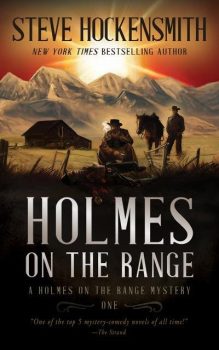 There are a lot of ways to go about writing a Sherlock Holmes story. Some folks attempt to very carefully emulate Sir Arthur Conan Doyle’s own style, and to turn out a tale that feels as if it might have been penned (or typed these days) by the creator of the great detective himself. No surprise that results vary. GREATLY. Hugh Ashton and Denis O. Smith are the best I’ve found in this regard.
There are a lot of ways to go about writing a Sherlock Holmes story. Some folks attempt to very carefully emulate Sir Arthur Conan Doyle’s own style, and to turn out a tale that feels as if it might have been penned (or typed these days) by the creator of the great detective himself. No surprise that results vary. GREATLY. Hugh Ashton and Denis O. Smith are the best I’ve found in this regard.
You can find stories ranging from pretty good to not suitable for (digital) toilet paper. I’ve had a half dozen of my own stories published and I’m still working on better voice the good doctor.
Some folks write whatever the heck they want, often with the name of Holmes being the only similarity to the famed detective. It is possible to find good Holmes stories that sound nothing like Dr. Watson’s narrative style, of course. And Holmes has been placed in different eras, and even worlds. In addition, there have been Holmes parodies around for over a hundred years. I’ve written a couple myself, and they were fun.
There are Holmes-like successors out there, of whom August Derleth’s Solar Pons is the best. Yes, I’m aware that’s a subjective judgment, but it’s mine, and I’m the one writing this essay, so it stands. I’ve written about Pons more than once, and even contributed introductions and pastiches to anthologies.
But today I’m going to look at one of Sherlock Holmes’ contemporaries; albeit, one quite different and far away. We’re not talking about Martin Hewitt here.
Steve Hockensmith had been writing short stories for Ellery Queen’s Mystery Magazine Christmas issue, and wanted to sell more to the venerable magazine. EQMM does an annual Sherlock Holmes issue, so he figured that was the way to go. But he wanted to write more than ‘just another Holmes story.’
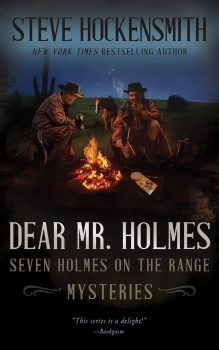 While out hiking in California nature, his muse spoke to him (sadly, my own has been observing a vow of silence for about five years now…) – cowboys, in the Old West, influenced by Sherlock Holmes. And so were born brothers Gustav (Old Red), and Otto (Big Red) Amlingmeyer. They are flame-haired, cattle-drive cowboys. Younger brother Otto’s sixth-grade education makes him the reader of the family, while the quiet Otto is the smarter of the two.
While out hiking in California nature, his muse spoke to him (sadly, my own has been observing a vow of silence for about five years now…) – cowboys, in the Old West, influenced by Sherlock Holmes. And so were born brothers Gustav (Old Red), and Otto (Big Red) Amlingmeyer. They are flame-haired, cattle-drive cowboys. Younger brother Otto’s sixth-grade education makes him the reader of the family, while the quiet Otto is the smarter of the two.
There have been seven novels so far, along with three story collections. Each short story is in the form of a letter from Otto to someone (a publisher, Dr. Watson, etc..), recounting one of their adventures, in which Gustav tries to apply Holmes’ methods. In the very first story, “Dear Mr. Holmes,” the letter is to Holmes himself, care of The Strand Magazine. Otto reveals that while on a cattle drive, another cowboy had found a magazine and kept it for the brothers, on account of their hair color. You guessed it – the story was “The Adventure of the Red-Headed League.” As Otto recounts:
“The title alone got a chuckle out of me. I read it out loud for Gustav (who can’t tell his As from his Zs or anything in between), but he just grunted. The boys around the fire got a fine laugh from it though, and they called out for me to read the whole story. Now along the trail I’ve got a reputation for oratory and poetry reciting and song singing and such, being under-blessed on modesty and powerful over-blessed on lung power. So I grabbed a lantern off the commissary and cleared my throat and gave the fellows a regular night at the theater.
Well, you’ll have to tell that Dr. Watson he’s a top-rail yarn spinner. The boys ate it up like it was hot doughnuts on Christmas morning. They were hooting and joshing me and Gustav fierce when they heard that burro milk about the locoed American tycoon giving away money to redheads. Not a one of them figured out it was just a bad man’s scheme, and when you caught the rascal red-handed (so to speak) trying to dig his way into a bank they cheered and clapped like you were right there with us doing back-flips.
Now usually the flannel-mouthed whopper-swapping you’ll hear around a cowboy campfire puts my brother straight to sleep. And for a minute or two I thought “The Red-Headed League” would be just another lullaby as far as he was concerned. But when I got to the part where you told that pawnbroker everything there was to know about himself—where he’d been and what he’d done and who he was, just from looking at him—Gustav perked up right smart. His eyes got all wide in a way I’d never seen, picking up the light from the fire and glowing like the big eyes of a hoot owl.
But though he was staring straight at me, I knew he didn’t see me or the campfire or the boys gathered around it. What he saw was you and Dr. Watson and that pawnbroker and everything else in the story. When I finished he even applauded along with the rest of the boys, which was peculiar indeed since a show of enthusiasm from Gustav is about as common as a six-legged mule or an honest bartender.
That dreamy-like look stayed on Old Red’s face all the next day. And when we were gathered around the fire that night, he asked me to read the story again.”
And so, in every story, there is some mystery to solve, and Gustav tries to apply Holmes’ methods, with Otto alongside. The setting and vernacular are very much the Old West – quite distinctive from Baker Street and Victorian London. While Dr. Watson is something of a lapdog to Holmes, Otto speaks his piece. Though due to the family’s tragic history, he nearly always bows to his older brother’s wishes.
It’s a clever twist, with the brothers believing that Holmes and Watson are real people (in fact, they are for purposes of these stories). And while the stories are from that venerable pulp and paperbacks mainstay, Westerns, bits of Holmes’ wisdom and methods are incorporated into each one, with Gustav the only character on the right path. They are constantly on the move, and while there are a few recurring characters, there’s no Lestrade, or Gregson. They encounter a variety of lawmen out in the West – none of whom appreciate Gustav’s amateur efforts.
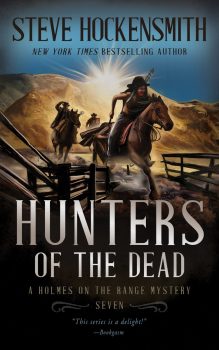 One reason I feel that this series ‘works’ for Holmes fans, is that it takes to heart two Holmes quotes from “The Boscombe Valley Mystery.”
One reason I feel that this series ‘works’ for Holmes fans, is that it takes to heart two Holmes quotes from “The Boscombe Valley Mystery.”
One is, “You know my method. It is founded upon the observation of trifles.” The other, “There is nothing more deceptive than an obvious fact.”
Nearly everyone around Gustav takes things at face value, and/or totally overlooks minor things. Diane Cavale is a notable exception – more on her later.
Often, Sherlock Holmes simply refuses to clue Watson in. Or, he makes an enigmatic remark which the good doctor can’t make heads or tails of. This allows the sleuth to keep his observations, deductions, and chain of thoughts, to himself. Which of course, keeps us readers guessing.
Gustav is a natural introvert, and he’s as likely to say nothing, as he is to utter aloud a sentence. As Otto says, if words were water, his brother would be Death Valley. This serves the same purpose as Holmes’ ‘keep it to himself’ approach. Otto will often note that Gustav seems to be interested in something, but he has no idea what: Or why.
And Otto tells us that Gustav likes to cite Holmes himself to validate his secrecy:
He’s got half a dozen Holmes quotes to choose from when he wants to justify keeping me in the dark. His favorite’s “It is a capital mistake to theorize etc. etc.,” but maybe he’d be in the mood for “You know my methods — apply them.” Which is just a fancy way of saying “Shut up, I’m thinkin’.”
It’s Otto’s observation of trifles, and his consistent evaluation of ‘obvious facts,’ which keeps him digging for more clay with which to make bricks. He looks for – and often finds – data which no one else even knows exists – let alone that they need it.
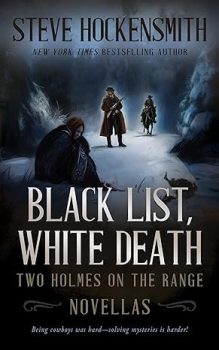 Speaking of data – Gustav loves to quote Holmes’ maxim, “It is a capital mistake to theorize before one has data.” He does it so often that an annoyed Otto will derisively cut off his brother and finish the quote himself. It’s amusing when the client in “Curious Incidents” is as big a fan of Holmes as Gustav is. Otto is inundated with Holmes quotes and maxims from every direction.
Speaking of data – Gustav loves to quote Holmes’ maxim, “It is a capital mistake to theorize before one has data.” He does it so often that an annoyed Otto will derisively cut off his brother and finish the quote himself. It’s amusing when the client in “Curious Incidents” is as big a fan of Holmes as Gustav is. Otto is inundated with Holmes quotes and maxims from every direction.
The letters’ introductions do a nice job of leading us into the story, and often let Otto’s humor show through.They set the table, while also giving the reader a smile.
One common ‘poke’ which Otto takes at his editor in the intro letters is about the sensational names which are bestowed upon his literary efforts. In “The Enchantress,” Otto implies to a client that he was less than thrilled that his ‘Curious Incidents’ was published as ‘Crimson Claws of the Phantom Puma.’ And it’s doubtful that he preferred ‘Buckaroo Sleuths Against the Ripper of the Range!’ to ‘The Crack in the Lens.’
He even sighs at ‘The Black Dove’ being renamed ‘Cowboy Crime-Busters Confront the Chinatown Menace.’
A pretty good example is found at the beginning of “Bad News”:
“Admittedly, I would have preferred it had you kept the title I supplied, ‘The Double-A Western Detective Agency’ – free advertising for our fledgling enterprise here in Ogden. But I will bow once again to your instinct as to the fickle tastes of the reading public. I won’t dwell on the fact that I offered up the alternative you’ve chosen to use (‘Cowboy Bothers Battle the New Mexico Death Baron!’) as a joke to illustrate exactly the kind of title I didn’t want. No, I shall not dwell on that at all – though I will perhaps take more care with the jokes I make in the future. (This would no doubt make my brother a happy man. Or a slightly less unhappy one, anyway.)”
The reader gets a pretty good handle on Otto from the first paragraph of the story. And we get a little bit of a peek at Gustav, as well.
Here’s a sample of the Sherlockian element from the last short story in Dear Mr. Holmes, “Greetings From Purgatory!” (which bridges the gap between The Black Dove, and The Crack in the Lens). Otto is trying to distract his brother, who gets violently train sick:
“Alright, then,” I said. “Let’s find something to focus on in here.” I made a quick study of the passengers in our line of sight. “Four rows up, other side of the car, on the aisle, facing us.”
Old Red took all of a second to size up the man I was singling out—a young drover about my own age.
“Feh,” he said. “You wanna distract me with some Holmesin’, you gotta throw me more of a challenge that that.”
“Really?” I shrugged. “Prove it.”
My brother shook his head and sighed…then reeled out his deducifications all the same.
“Feet, face and hands—that’s what tells the story of a man, no matter the duds he’s sportin’. And that feller’s feet, face and hands don’t just tell the story. They shout it. Why, even from here I can see he ain’t got dirt under his nails. And he fancies himself a cowboy, but he ain’t got the tan you’d find on a soda jerk. His boots ain’t got no crease nor fade, and they’re big ol’ things, too—for a flat-footed feller who’s walked everywhere his whole life ‘stead of ridin’ there in a saddle. And his hat’s still stiff and clean.
Ain’t never been rained on or used to hold water or oats for a horse. Naw, right there you got a city boy who’s got his head filled up with Buffalo Bill bull. He’s runnin’ off to try his hand at punchin’ somewhere on the Plains, only he don’t even know this is the worst time of year to do it.
Fall round-ups’ll be over by the time he even makes it to a ranch. His mother—she’s a left-handed Irish-born charwoman, by the by—she tried to stop him, but . . . . ”
My brother cut himself off with another grunted “Feh” and a dismissive swipe of the hand.
“It deduces itself.”
Gustav’s ‘Feh’ serves as Nero Wolfe’s ‘Pfui’ does, which I very much appreciate.
I think Otto is an excellent narrator in tone and word choice. Hockensmith is a good writer and his prose style flows easily – which is nothing to dismiss when your characters speak like they’re from an episode of Wagon Train. Here’s another example from “Greetings From Purgatory!”:
“Now, as a lot, conductors aren’t overly fond of cowboys, my former profession tending toward young rowdies ill-equipped for long stretches cooped up in what is basically a bunkhouse on wheels. And though I was sporting my fine new Frisco-bought suit, Old Red still insisted on dressing like a dollar-a-day ranch hand. Which might explain why the conductor was grimacing at Gustav like a vulture circling something so yuck-ugly even it wouldn’t swoop in for a taste.
“That’s not my problem,” the man sneered.
Regrettable sartorial choices aside, of course, Gustav and I had been taking pains not to draw attention to ourselves. So I might not have put up an argument but for two things. Firstly, it was dusk, and after a few more minutes of “The Musgrave Ritual” the snow-topped peaks and yawning chasms passing by the windows would be safely swallowed by darkness—and the few crumbs my brother had swallowed that day would have a better chance of staying swallowed, Holmes or no.
And secondly . . . well, the conductor was a high-handed S.O.B., and it just plain got on my nerves.”
Nicknamed Big Red because of his size, Otto is talkative and outgoing. He often tries to smooth the choppy waters they find themselves in. As he says to Gustav in “Bad News,” “Did my best to smooth down all the feathers you was rufflin’, too. But you couldn’t seem to stop your rufflin.”
Sometimes, I see some of James Garner’s Jim Rockford, or maybe Bret Maverick (big fan of both, but I prefer Rockford), in Otto. You can ‘see’ that chagrined smile, as Otto tries to bluff his way into – or talk his way out of – something.
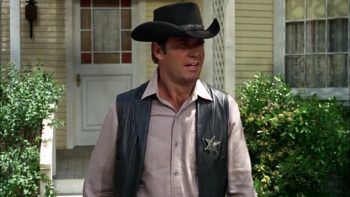 It wouldn’t be too wild of a guess that author Hockensmith is a fan of Garner’s Support Your Local Sheriff (one of my favorite Westerns).
It wouldn’t be too wild of a guess that author Hockensmith is a fan of Garner’s Support Your Local Sheriff (one of my favorite Westerns).
Unlike Otto, Gustav is quiet and often taciturn. His nickname is Old Red because he most often acts like a grumpy old man (he’s only about 25, and much smaller than his brother). Gustav almost never brings humor into things. That’s entirely Otto’s job.
Gustav’s curtness can cross over to rudeness, though he can be polite. Usually he’s so focused on his investigation he disregards any niceties that don’t aid in it. He can be nervous talking to a group, and he is pathologically shy around pretty women.
I am a HUGE fan of The Adventures of Brisco County, Jr.. One of the elements of that show was Brisco talking about ‘The Coming Thing.’ The show worked in future developments, like denim, motorcycle gangs, and blimps. It was cute.
The second novel, On the Wrong Track, includes Professor Pertwee’s Health Miracle Nut Butter. This is essentially a very early version of peanut butter. It would be heard of again, and it’s an amusing inclusion.
There are plenty of Holmes quotes. Since Otto reads the magazine stories to Gustav, he knows them as well as his brother does. Watson was talking about Holmes being the perfect reasoning machine in “A Scandal in Bohemia,” and says:
Grit in a sensitive instrument, or a crack in one of his own high-power lenses, would not be more disturbing than a strong emotion in a nature such as his.
That quote provides the title for book number three, The Crack in the Lens. And since the plot revolves around Gustav’s murdered lost love, it’s perfectly fitting. Hockensmith knows his Holmes, and the series basks in it. When the boys have to use false names, Lestrade, Gregson, Melas, and Pycroft, are among those they choose.
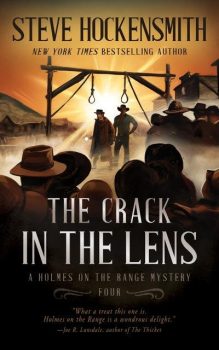 I hesitate to say this definitively, but most of the stories have an O. Henry twist at the end. Especially in the short stories, I appreciate what this brings at the conclusion. Short stories don’t have nearly as much room to ‘do things’ as novellas and novellas do. It’s one reason I really admire what Ed McBain and Lawrence Block accomplished in the form. Reading about Old Red and Big Red is always fun. And having that ‘something surprising’ at the end of Gustav’s Sherlocking, makes for a more satisfying finish.
I hesitate to say this definitively, but most of the stories have an O. Henry twist at the end. Especially in the short stories, I appreciate what this brings at the conclusion. Short stories don’t have nearly as much room to ‘do things’ as novellas and novellas do. It’s one reason I really admire what Ed McBain and Lawrence Block accomplished in the form. Reading about Old Red and Big Red is always fun. And having that ‘something surprising’ at the end of Gustav’s Sherlocking, makes for a more satisfying finish.
There were five novels from 2006 through 2010, followed by a short story collection in 2011. The brothers returned in a new novel in 2018. 2023 was a Holmes on the Range stampede, with a novel in October, a short story collection in November, and two novellas in December! Plus a short story in Ellery Queen’s Mystery Magazine.
I have developed a comprehensive chronology, which will be next week’s post.
The novels have all been reprinted and are readily available in paperback. As are the three story collections. All ten books are also available digitally.
In fact, all but the most recent book are a part of Kindle Unlimited, so you could definitely check the series out if you are a sub to that service.
Also, all but the latest novella collection are available as audiobooks. William Dufris narrates the first five novels. He plays it too over-the-top hillbilly for my taste. I own Dufris reading The Maltese Falcon, and I keep hearing his Brigid O’Shaunnessy as he voices Diana Cavale. And that’s kind of annoying.
John McClain voices one novel, and Chuck Galco narrated the most recent novel, and the new short story collection. I’ve not heard either of them narrating, yet.
Barry Campbell narrates the first short story collection. He’s more subdued than Dufris, but still not ideal.
So, all of this is to say you can read or listen to these books quite easily. And you absolutely should!
More HOLMES ON THE RANGE!
A Q&A with Steve Hockensmith
A Holmes on the Range Chronology

Bob Byrne’s ‘A (Black) Gat in the Hand’ made its Black Gate debut in 2018 and has returned every summer since.
His ‘The Public Life of Sherlock Holmes’ column ran every Monday morning at Black Gate from March, 2014 through March, 2017. And he irregularly posts on Rex Stout’s gargantuan detective in ‘Nero Wolfe’s Brownstone.’ He is a member of the Praed Street Irregulars, founded www.SolarPons.com (the only website dedicated to the ‘Sherlock Holmes of Praed Street’) and blogs about Holmes and other mystery matters at Almost Holmes.
He organized Black Gate’s award-nominated ‘Discovering Robert E. Howard’ series, as well as the award-winning ‘Hither Came Conan’ series. Which is now part of THE DEFINITIVE guide to Conan. He also organized 2023’s ‘Talking Tolkien.’
He has contributed stories to The MX Book of New Sherlock Holmes Stories – Parts III, IV, V, VI, XXI, and XXXIII.
He has written introductions for Steeger Books, and appeared in several magazines, including Black Mask, Sherlock Holmes Mystery Magazine, The Strand Magazine, and Sherlock Magazine.
The best Holmes parody I’ve ever read is “Maddened by Mystery or, the Defective Detective” by the Canadian humorist, Stephen Leacock. It’s in his book Nonsense Novels, which consists of parodies of various nineteenth and early twentieth century popular genres – the sea story, the ghost story, the Horatio Alger “up from nothing” success story, the H.G. Wells-style science fiction story (“The Man in Asbestos: an Allegory of the Future”) etc. I pay no attention when things are described as “laugh out loud funny”, because it takes a LOT to make me laugh out loud. Leacock makes me laugh out loud.
After bouncing off the first two novels (A Study in Scarlet, The Sign of the Four), I gave the Great Detective one more go with the short stories in Adventures of Sherlock Holmes, and I have not ceased since. And I have sampled many a pastiche or homage. One favorite is Guy Davis and Gary Reed’s comic series Baker Street, collected as Honour Among Punks and Children of the Night, featuring a punk-life detective named Sharon Ford (clear clue for Sherlock fans). Another is Neil Gaiman’s “A Study in Emerald”, which has a nifty twist ending that flips the story so neatly. Of course, it was also fun to see Mr. Gaiman at the 2004 Hugo Awards ceremony, in which he gave himself the Hugo for “Study”, in a real-life twist ending.
Several years ago, I wrote this essay on which Holmes story to read first. The first two novels aren’t the best examples. Folks who begin with The Adventures almost always seem to be immediately become fans.
I have thousands of pastiches. They range from dismal to terrific. Can be pretty hit and miss – you just have to find the authors you like.
https://www.blackgate.com/2015/04/06/the-public-life-of-sherlock-holmes-what-story-should-you-read-first/
Thank you Bob! I have loved these stories since I read the first one in EQMM one weekend morning many years ago!
You’re welcome. That’s cool that you’ve been along for the ride from the beginning. I’m a relative latecomer compared to you. But going through every story and novel, in a row, was a lot of fun.
You should enjoy the Q&A with Steve, this coming Monday.